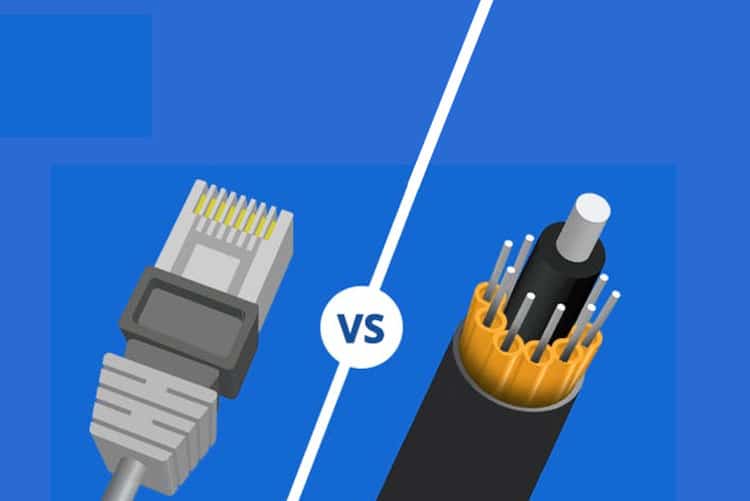A strong, unwavering internet connection is the basis for effective business communication. The type of internet connection chosen by a business has a direct impact on the satisfaction levels of their employees, customers, and business partners.
The quality of internet connection strongly affects productivity and efficiency on a regular basis, which can have a serious impact on sales and profits.
Normally internet users do not have an idea about the different types of internet connections. Most businesses only want an internet connection that works well without any lag time or freezes time.
There two most popular internet connections are fiber and cable internet. Both fiber and cable internet are different in their structure, reliability, availability, speed, and cost.
Let us understand more about both the internet services to help answer the big question “Which is the right internet connection for your business?”
What is fiber internet? How does fiber optic internet work?
Fiber internet uses fiber-optic cables for delivering the internet. The fiber optic cables are made of very thin strands of glass or plastic which are known as optical fibers.
The optical fibers are held in an inwardly reflective cladding, this helps the fibers to carry the light signals irrespective of bends or curves in the cable. Each cable holds several optical fibers in it.
Fiber optic internet uses light signals to transport internet data, this helps in the transmission of data over long distances. Fiber cables are less prone to signal interference.
What is cable internet?
Cable internet uses copper coaxial cable for delivering internet. They are the same type of cables which are used for cable TV. The cables have a copper core with an insulating sheath.
The core is shielded by aluminum and copper shields and an outer plastic layer. The data in cable internet is carried in the form of binary electrical signals.
The copper cables are shared by several homes or a whole neighborhood for their internet and TV access. In simple words, in cable internet, the users share the bandwidth.
Now that we have an idea about both types of internet connection, let us study the difference between cable and fiber optic internet to determine which of the two is the right choice for your business?
Fiber vs. Cable internet – Reliability
Even though Cable internet is a reliable internet connection, if your business is located in an area that experiences frequent cable outages or interruptions, there are high chances your internet service will also be impacted.
Comparatively, Fiber-optic internet is more reliable than cable internet. Fiber internet does not require power to be applied within the system network, hence even during a case of a power outage, a fiber-optic internet connection is less likely to be affected.
Since the fibers are made of glass which does not generate electricity, it makes them immune to interference caused by passing power lines or high-voltage electrical equipment.
Fiber vs. Cable Internet – Availability
Cable internet connections are easily accessible and available. They have a coverage of 89% across the country. If your area or location has access to a television network, you can access cable internet too.
Your TV cable network provider can also offer you cable internet services. Comparatively fiber optic internet connections are not as easily accessible and available as cable internet.
Presently only 25% of locations in the country can avail fiber internet, it is commonly found in metro areas. Accessing fiber internet is difficult for businesses set up in remote areas.
Fiber vs. Cable Internet – Speed
The download speed of cable internet is in the range of 10 to 500 megabytes per second (Mbps) whereas its upload speed is around 5 to 50 Mbps.
This range of speed is sufficient and suitable for most small-scale businesses. Cable internet can accommodate video streaming and heavy downloads, however since it is a shared network when the traffic is high the speed reduces.
A 25% reduction in speed is experienced during the peak hours of use. At the same time, Fiber-optic internet connection is faster as compared to the cable network.
It offers a speed of 250-1,000 Mbps for both uploads and downloads. Several people can work on the same fiber network at the same time without facing any speed or performance issues.
Fiber internet is ideal for big businesses or MNCS which need constant internet speed even during peak periods.
Fiber vs Cable Internet – Cost
A cable internet connection is considered to be cheaper as compared to a fiber internet connection however over the years the costs associated with fiber optic have also come down significantly.
Though fiber internet is costlier than cable internet, many fiber internet service providers are today offering services comparable to cable service costs.
The cost of cable is determined by the location and whether you have deiced to avail of a bundle of television, phone, and internet services from the provider. The fiber-optic internet cost is determined by the usage, the speed of the internet, and location.
Conclusion:
The information technology needs of each organization can vary drastically. Though the advantages of fiber optic Internet are making it a more popular and common choice for business data transmission there are still many companies who are satisfied and happy with their cable internet connections.
Integral Choice is a Telecommunication and Cloud Agency that can help you choose the right internet connection and service provider for your business needs.
We at Integral Choice aim to provide the best in internet solutions for your business while driving strong value which has a positive impact on your bottom line. Our extensive resources, experience, and network of internet service providers help us to achieve this goal.

